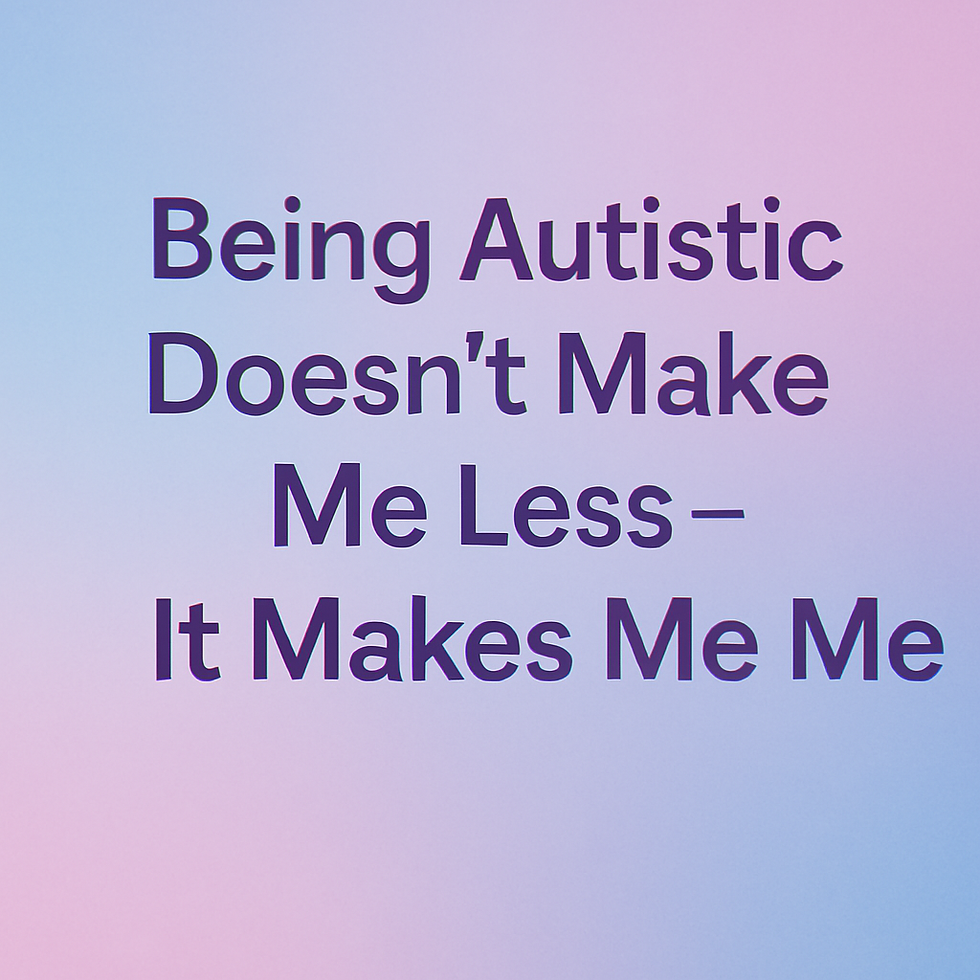Rethinking Autism: Why Acceptance Is More Than Awareness
- James Link

- Mar 29, 2025
- 3 min read

Autism is not a flaw. It’s not a deficit. It’s a different way of experiencing the world — and it’s time we stop treating that like a problem that needs to be fixed.
We hear a lot about “awareness,” especially in April. But awareness isn’t enough. People are aware. What we need now is acceptance. True, unfiltered, no-strings-attached acceptance. The kind that says, “You don’t need to change who you are to belong here.”
Autistic people aren’t broken.
We’re not puzzles waiting to be solved. We’re individuals with strengths, challenges, insights, and voices that matter. What we need is space to be heard, opportunities that are real, and support systems that see us — not just our diagnosis.
Autism isn’t one-size-fits-all. It never was. But what can be universal is how we choose to approach it — with compassion, respect, and the willingness to learn from lived experience.
I think a lot of the time, society doesn’t realize how exhausting it can be to constantly mask — to have to translate your natural way of being into something the world finds more comfortable. That level of effort? It’s not sustainable. And it shouldn’t be necessary. Autistic people should be able to show up as themselves — whether that means stimming, needing extra processing time, or communicating in ways that aren't considered “mainstream.”
We don’t ask birds not to fly or trees not to grow tall. So why do we ask autistic people to shrink themselves down just to be accepted?
Masking may make others feel more at ease, but it comes at a deep cost — burnout, anxiety, depression, identity loss. It teaches people that their authentic self isn’t good enough. And we need to be loud and clear that this is not the message we want to send anymore.
When we talk about inclusion, we have to mean it. That includes classrooms, workspaces, public places, and relationships. It means listening without judgment, honoring communication differences, and letting go of this outdated idea that success has to look neurotypical.
True inclusion also means that accommodations aren’t optional. They’re not “special treatment” — they’re access points. Whether it’s noise-canceling headphones, communication devices, or a flexible work schedule, these supports make it possible for autistic individuals to thrive, not just survive.
We need more autistic voices in leadership, in advocacy, in innovation — not just because it’s fair, but because it makes the world better. Our perspectives bring value. Our differences drive change. And when people stop trying to fit us into a mold, we create space for real progress.
It’s not enough to celebrate autistic people for being “brilliant” or “gifted” in specific ways. Acceptance is about valuing all autistic people, not just the ones who meet someone else's idea of success. Whether someone is verbal or nonverbal, independent or needs support — every autistic person deserves to be seen and respected.
We also need to stop measuring worth based on productivity or performance. Human value isn’t tied to how fast you can work, how well you can communicate, or how closely you meet a set of socially constructed standards. It’s about presence, purpose, and being treated with dignity — full stop.
Parents, educators, employers, peers — this is your call to listen more deeply. To pause before reacting. To recognize that your way of thinking isn’t the only way. Acceptance means shifting the lens. It means asking, “How can I support this person as they are?” instead of “How can I make them fit better into my world?”
I’m not here to blend in. I’m here to speak out. I want the next generation of autistic kids to grow up knowing they don’t have to apologize for who they are. I want them to see representation that feels real. I want them to know that their future is theirs — not limited by stigma, but shaped by possibility.
I also want them to see role models who lead unapologetically, who advocate with both strength and softness, and who know that being different isn’t just okay — it’s powerful. Because it is. And we should never lose sight of that.
Because being autistic doesn’t make me less. It makes me me. And that should be more than enough.
Acceptance isn’t optional. It’s the bare minimum. And it’s something we can all start practicing today — in our language, in our actions, and in the way we show up for others.
Change doesn’t have to be loud. Sometimes it starts with just one person choosing to see differently — and from there, a ripple becomes a wave.





Comments